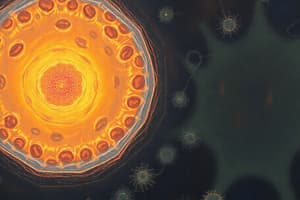Podcast
Questions and Answers
What best describes a prokaryotic cell?
What best describes a prokaryotic cell?
- Multicellular, large
- Unicellular, small (correct)
- Contains a nucleus
- Membrane bound organelles present
What holds DNA in a prokaryotic cell?
What holds DNA in a prokaryotic cell?
Cytoplasm
Prokaryotic cells have a nucleus.
Prokaryotic cells have a nucleus.
False (B)
Name an example of a prokaryotic cell.
Name an example of a prokaryotic cell.
What do prokaryotic and eukaryotic cells have in common?
What do prokaryotic and eukaryotic cells have in common?
Which structure is present in eukaryotic cells?
Which structure is present in eukaryotic cells?
Which of the following is true regarding eukaryotic cells?
Which of the following is true regarding eukaryotic cells?
Name examples of eukaryotic organisms.
Name examples of eukaryotic organisms.
Flashcards are hidden until you start studying
Study Notes
Prokaryotic Cells
- Unicellular organisms that are generally smaller in size compared to eukaryotic cells.
- The cytoplasm within prokaryotic cells holds the genetic material, DNA, which is not enclosed in a nucleus.
- Lack of a true nucleus and membrane-bound organelles, distinguishing them from eukaryotic cells.
- Common examples include various forms of bacteria, showcasing the diversity within prokaryotic life.
Eukaryotic Cells
- Characterized by the presence of a nucleus that houses their DNA, distinguishing them from prokaryotes.
- Contain membrane-bound organelles, which perform specialized functions within the cell, enhancing efficiency.
- Generally larger in size than prokaryotic cells, allowing for more complex structures and functions.
- Include a variety of organisms such as animals, plants, and fungi, highlighting the complexity of life forms.
Shared Characteristics
- Both prokaryotic and eukaryotic cells contain DNA as genetic material, critical for inheritance and function.
- Both cell types possess a cell membrane that regulates entry and exit of substances, maintaining homeostasis.
- Cytoplasm is present in both, providing a medium for biochemical reactions essential for life.
Studying That Suits You
Use AI to generate personalized quizzes and flashcards to suit your learning preferences.




